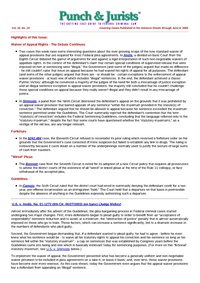Loaded on
June 1, 2003
published in Punch and Jurists
June 09, 2003
In U.S. v. $242,484.00, 318 F.3d 1240 (11th Cir. 2003) (P&J, 03/10/2003), the Eleventh Circuit reversed a forfeiture order that had been granted under 21 U.S.C. § 881(a)(6) on the grounds that the Government had failed to prove any link to illegal drugs. Despite a lot of suspicious evidence …
Loaded on
June 1, 2003
published in Punch and Jurists
June 09, 2003
The defendant in this case pled guilty to conspiracy to commit wire fraud. While serving a prison sentence, the defendant and a co-defendant devised a scheme under which telephone calls placed by inmates were billed to other people. The government conditioned a two-level reduction in the co-defendant's offense level …
Loaded on
June 1, 2003
published in Punch and Jurists
June 09, 2003
Scott Shimoda, the defendant in this case, pled guilty to a single count of possession with intent to distribute 500 grams of more or cocaine, in violation of 21 U.S.C. §§ 841 (a)(1), 841(b)(1)(B)(ii) and 846. His plea agreement contained a standard waiver of appeal provision which stated, in …
Loaded on
June 1, 2003
published in Punch and Jurists
June 09, 2003
Here the Court held that the district court had erred in concluding that it was without authority to grant the defendant credit for a two-year, pre-offense incarceration as an immigration “hold,” since such departures are not categorically prohibited.
The defendant in this case was convicted of an assault …
Loaded on
June 1, 2003
published in Punch and Jurists
June 09, 2003
Here the Court held that the district court had erred in not permitting the defendant to withdraw his guilty plea on the grounds that it was not knowing, intelligent or voluntary because he was not informed that drug quantity was an element of his offense to be proven beyond …
Loaded on
June 1, 2003
published in Punch and Jurists
June 09, 2003
The defendant inmate was convicted of several drug offenses and was sentenced to 324 months and 120 months in prison in 1994. The defendant moved to vacate, set aside, or correct his sentence based ineffective assistance of counsel. In 2000, he filed a supplement to his motion raising an …
Loaded on
June 1, 2003
published in Punch and Jurists
June 09, 2003
Here the Court held that it was without authority to rule on the substantive question of whether it is fundamentally unfair for the Government to institute a criminal prosecution in the federal district court and then deny the defendant access to a potentially favorable witness, because the order of …
Loaded on
June 1, 2003
published in Punch and Jurists
June 09, 2003
Almost immediately after the advent of the Guidelines, the plea bargaining process in Federal criminal cases started undergoing two major changes. First, more defendants began to plead guilty to order to benefit from an “acceptance of responsibility” sentence reduction and to avoid, at a minimum, the “obstruction of justice” …
Loaded on
June 1, 2003
published in Punch and Jurists
June 09, 2003
In this case a divided panel from the Second Circuit held that the rule established in Apprendi does not apply retroactively to initial habeas corpus petitions - because while Apprendi "unquestionably announced a new rule of law," the new rule that Apprendi established was procedural in nature - and …
